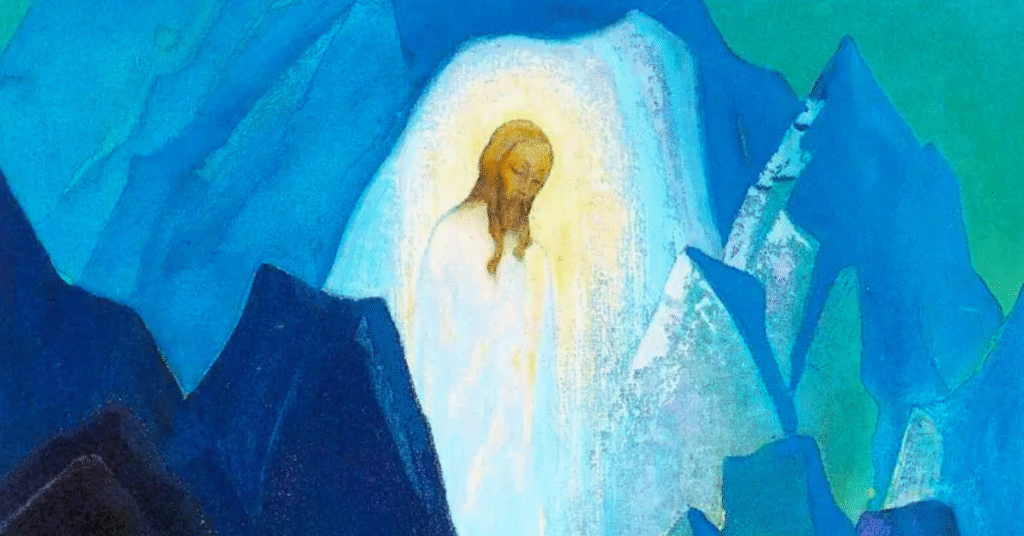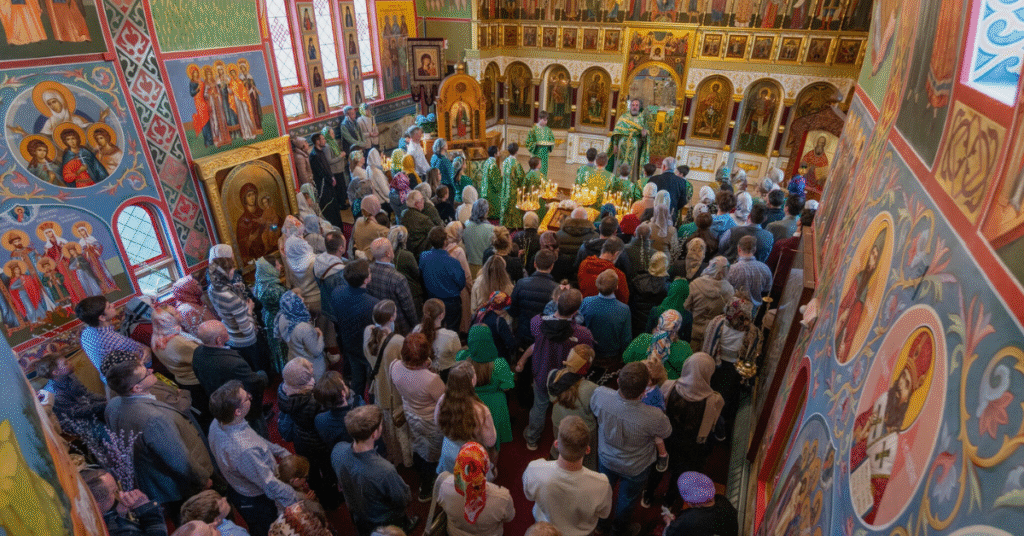God likes to show up in unexpected places. As a child, I found him in friendships and books and rainstorms. When I was a young adult, he sometimes showed up in movie theaters, sometimes in literature classes, sometimes in the faces of strangers on the bus. In truth, I didn’t look for him very hard; his presence was always a subtle surprise, one I usually chose to ignore.
Today I find him (most reliably, at least) in a particular church building, while surrounded by candles, icons, chanted prayers, and the body heat of far too many people to comfortably fit in the provided space, even standing pressed close together like worshipful sardines as we do. Surrounded by far too many people for my emotional comfort, too—a few of them hold opinions I find intolerable, one or two have personalities that clash with mine, and, in my ungenerous heart, there are a couple I just plain-old don’t like. But they’re there, trying to pray in spite of the giggles and squawks of all the wild children weaving through the room, and I’m there, because my priest tells me the church is a hospital for the sick and that includes me even if I like to pretend otherwise, and God is inexplicably there too. Personally, I’d be less surprised to find him pretty much anywhere else than in this crammed space, with its whirl and buzz of human pettiness and need and brokenness.
God works in more than one way, indeed.
Magic in a post-Christian world
We are no longer living in Christendom. This is probably not news to you, but it’s something I hadn’t thought much about until listening to a recent Pivot Podcast episode with Christian Smith. Our culture is an entirely post-Christian one. Most people aren’t rejecting religion because they’ve studied theology and found it lacking: they’ve just never really thought about it at all. Christianity is barely even offensive anymore (the missionary kid within me, the one raised on “Jesus Freak” and the insistence that Christians are counter-cultural, pious victims of a devilish world, balks at this fact). It’s just… irrelevant. Like horse-drawn carriages. Or fax machines. Or MySpace. How odd.
But people haven’t stopped seeking transcendence. Modern life tends to flatten mysteries and explain away magic, but humans aren’t keen to let the lovely things go. It just no longer crosses their minds to seek the divine from a pew. As I mentally thumb through the people I know and love, I can generate an enjoyably diverse list of their personal sources of transcendence: book clubs, stained glass projects, sisterhood, counseling sessions, Mother Nature. The world is full of mystery and brightness, when you look for it. God is peeking through, all over the place, and working in many, many ways.
Self-forgetfulness and mysticism
I visited a church recently while with relatives, and felt uncomfortable by the third worship song. Someone had made the unlucky choice to play multiple songs in a row where one word was vocally sustained during the emotional peak of the chorus. In each song, that word was “I” or “my” or “me.” My love, my sin, my devotion, my need. My God.
Aren’t we all getting a bit tired of ourselves by now, in this personalized, curated, self-referential world? No wonder we all crave something more and bigger and stranger and older. If I’m honest with myself, that was likely part of the appeal I found in my current church, an Orthodox one. It was so old it was new, so non-individualistic it was entrancing, so jam-packed with bright color and strong scent and all-encompassing sound that I thought (or hoped?) I’d be able to just vanish into the mystery and the mysticism and the magic of it all, the very real humans in the room, myself included, subsiding into an indistinct background blur.

I don’t necessarily judge myself too harshly for that fact, because God made do with whatever worked, I suppose, and Jennie Wojciechowski has plenty of positive, interesting thoughts on the role that mysticism can play in this secular, distinctly unmagical, self-centered world; but it’s something I try to stay aware of in myself. Like so many of us, I sometimes want to escape the very real discomforts and people around me, and my own very real, heart-deep ugliness… when maybe (probably?) the true way forward has everything to do with those good, bad, and ugly here-and-nows and humans.
Sharing, and faith, and the sharing of faith
God works in many, many ways in this world. He acts and speaks in every place he can. A too-small Russian Orthodox church full of people who squabble and sin and step on each other’s toes. A hospital ward. A library. A playground. A bike shop. Whatever.
So shouldn’t we work in many ways too? And act and speak, gently and respectfully and contextually, in every place we can?
I don’t think “evangelism” in a post-Christian culture starts with an invitation to church. I’m sorry, I know you probably know this already, but it’s worth saying again. The sharing of faith starts simply with sharing. The sharing of life: grief and joy, nurturing, building, walking, talking, being. With active presence, wherever our neighbors are and wherever we are, together.
There’s no one-size-fits-all model of church anymore. The village vicar and the offering plate are relics compared to dinner tables and hikes and recovery groups. God is at work there, working in all the ways and doing all the things. I think all we can really do is join him there, whatever that means.
Our call hasn’t changed, though the landscape very much has. We’re still witnesses to the love of a Triune God, but we’re learning to speak new languages of grace: beauty, story, silence, community. We give in to wonder, and explore unexpected spaces. We’re baffled by magic and mystery together, and experience all the tiny, mundane pleasures and tensions and pinches that give life its texture, together.

